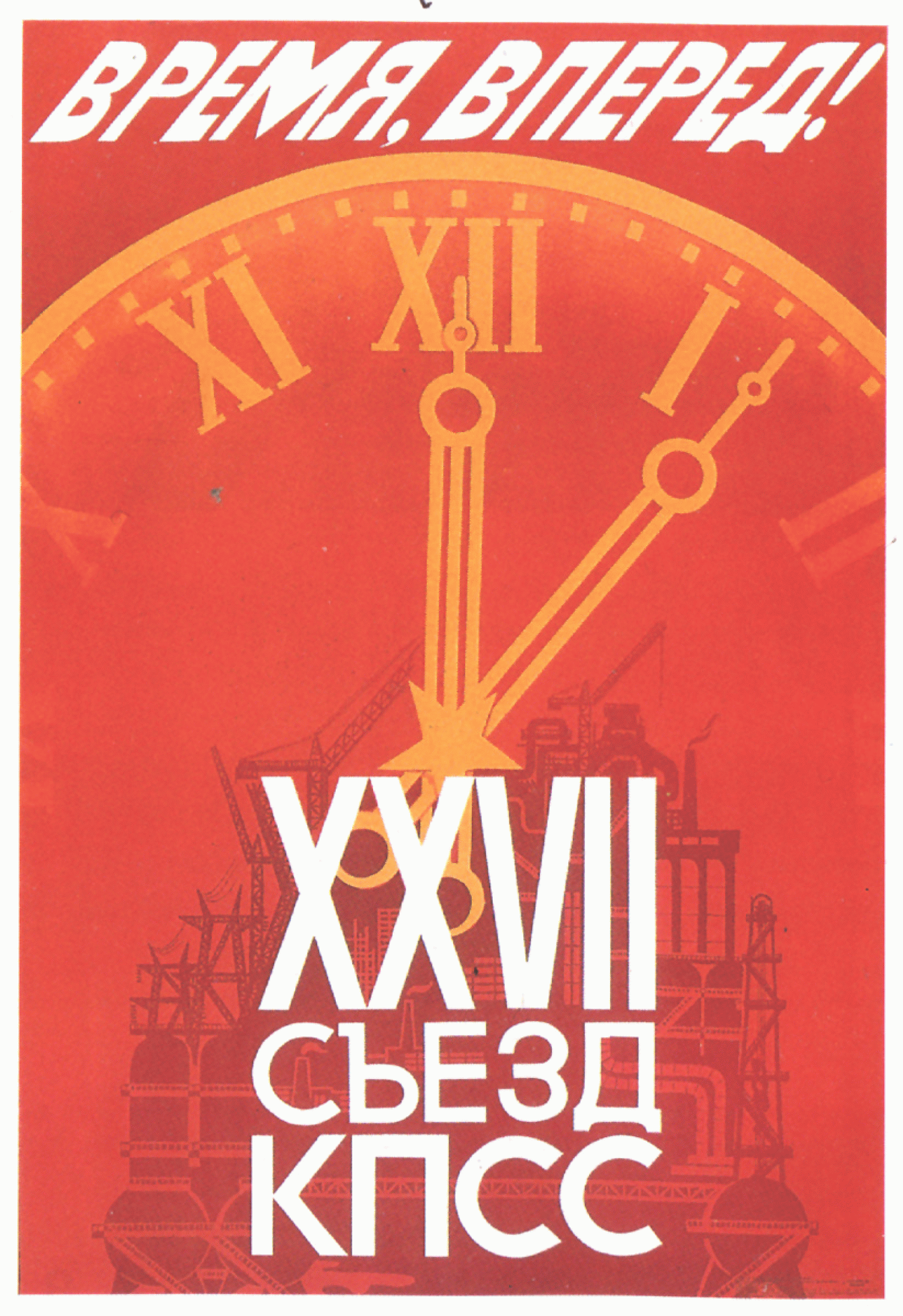Convegno
Temporality and Material Culture under Socialism
International Conference organized by Julie Deschepper, Antony Kalashnikov, and Federica Rossi

Poster, "Time Forward. XXVII Congress of the CPSU”, V. Tsiler, A. Sheliutto, S. Vajchenko. Editions “Plakat”, 1986
This conference focuses on the relationship between temporality and material culture in twentieth-century socialist regimes in different geographical contexts. Among others, the conference will tackle the following issues: how does material culture reflect, embody, and represent the specific relationship to time under socialism? What was unique about the way temporality under socialism affected material culture? How did the circulation of material culture contribute to the circulation of representations, perceptions, and conceptions of “socialist time”?
Program
All time CEST (Florence, Italy)
Thursday, July 1
10:00 Welcome and introductory remarks by Gerhard Wolf
10:10 Introduction, Julie Deschepper
10:30–12:30 Panel 1. Soviet Experiments: From the Everyday to Geological Time
Chair: Gerhard Wolf
Nick Baron, University of Nottingham
‘The Friction of Time against Space’: Cartographic Temporalities in Stalinist Culture
Natalia Maksimishina, CEU Budapest
Radio City in the Soviet Arctic: Time and Temporality in the Soviet Arctic in the 1930s
Andreas Schönle, University of Bristol
The Five-Day Week and Soviet Temporality in the Early 1930s
Ana María Gómez López, University of Amsterdam
Deep Space, Deep Time: Ivan Efremov’s Paleontological and Intergalactic Explorations of Past and Future Planetary Histories
14:00–15:30 Panel 2. Temporalities in Early Soviet Socialism
Chair: Antony Kalashnikov
Federica Rossi, Kunsthistorisches Institut in Florenz – Max-Planck-Institut
Appropriating History: Architecture and Time in Early Soviet Era
Reed Johnson, Bowdoin College
Last Stop, Communism: Time as Space in the Soviet Political Poster
Harriet Murav, University of Illinois
The Longing to Arrive: The Yiddish Socialist Realist Fiction of David Bergelson
16:00–18:00 Panel 3. Socialism and Material Heritage
Chair: Julie Deschepper
Irina Sandomirskaja, Södertörn University
From Nasledie to Nasledie: Fragments of History of the Soviet Symbolic Economy of the Past
Vladimir Kulić, Iowa State University
History Re-Stitched: The Simultaneous Temporalities of Yugoslav War Memorials
Oana Ţiganea, Politecnico di Milano
Continuity and Discontinuity in the Heritage-Making Process in Socialist Romania. The Case Study of the Industrial Built Legacy in Banat and Transylvania
Caterina Preda, University of Bucharest
“Dear Comrades, Visit Your Past!”: the Politics of Daily Life Museums of Communism in Romania
Friday, July 2
11:00–12:30 Panel 4. Embodied Time: Art, Fashion, and Design
Chair: Giovanna Targia
Ekaterina Kulinicheva, Higher School of Economics, Moscow
From Enemy to Ally: Late Soviet Theory of Fashion and the Problem of Time
Hana Gründler, Kunsthistorisches Institut in Florenz – Max-Planck-Institut
The Weight of Time. Time and Temporality in Czech ‘Non-Conformist’ Art and Philosophy, 1960–1980
Dora Derado, University of Split, Faculty of Humanities and Social Sciences
Time = Money: The Relationship of (Art)Work and Time in the Socialist Republic of Croatia as Seen through the Works of Mladen Stilinović
14:00–16:00 Panel 5. Time Materialized: Socialist Transcultural Encounters
Chair: Antony Kalashnikov
Carlotta Castellani, Università di Firenze
Lenin’s Monument Projects. El Lissitzky and László Peri’s New Space-Time Conceptions
Mariya Petrova, Leibniz Institute for Regional Geography, Leipzig
Jonas Van der Straeten, Technical University of Darmstadt
Rhythms, Rush and Stubborn Materialities: The Disconnected Temporalities of Sovietizing Samarkand
Douglas Gabriel, George Washington University
Adri Kácsor, Northwestern University
Architecture in Anticipation: The Time and Space of Socialist Friendship between Hungary and North Korea in the 1950s
Uta Leconte, Technical University of Munich
Response and Delay: Building Interdependent Ideologies at the Case of the World Trade Center Buildings in Moscow and New York
16:30-18:30 Panel 6. The Urban Environment and Remediated Temporality
Chair: Gabriella Cianciolo
Marie-Madeleine Ozdoba, German Center for Art History–DFK Paris
Building the New Times of Socialism: Trans-medial Narratives in the Center of Berlin, Capital of the GDR
Martin Babička, Oxford University
“Today in a House”: Time and the City on Late Socialist Czechoslovak TV
Deirdre Madeleine Smith, University of Texas
“Požuri polako” (Hurry Slowly): Impatience, Disjuncture and the Urban Pastoral in Socialist Zagreb
Julia Keblinska, UC Berkeley
New Era, New Media: The Techno-Aesthetic Temporality of Chinese Postsocialism
18:30 Conclusion, Federica Rossi
Scarica
01 – 02 luglio 2021
The event takes place online.
To participate please register in advance via Zoom. Please note that a separate registration is necessary for each day of the conference.
1 July 2021:
https://zoom.us/meeting/register/tJYpceGqqTwvHdBlG6yohaYUIg5frGwMEAcn
2 July 2021:
https://zoom.us/meeting/register/tJwlfu-hqz8uEtJhlrY52K1c6WjcDQXIPEw0
After registering, you will receive a confirmation email containing information about joining the meeting.
Avviso
Questo evento viene documentato fotograficamente e/o attraverso riprese video. Qualora non dovesse essere d’accordo con l’utilizzo di immagini in cui potrebbe essere riconoscibile, da parte del Kunsthistorisches Institut in Florenz a scopo di documentazione degli eventi e di pubbliche relazioni (p.e. social media) la preghiamo gentilmente di comunicarcelo.




